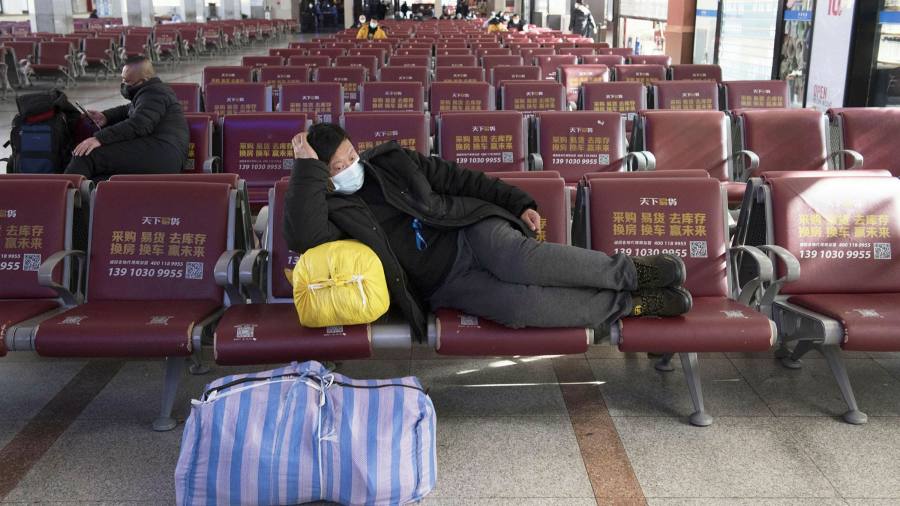[ad_1]
Travel for China’s lunar new year holiday, the largest annual human migration on earth, has been reduced to a trickle this year after the government asked citizens to stay put to curb the risk of spreading coronavirus.
Mass testing, quarantines and contact tracing have largely smothered Covid-19 transmission within China since March, allowing the economy to stage a rapid recovery.
But the government, determined to guard against even small-scale outbreaks, wants to minimise long-distance travel during the biggest holiday of the year. China’s state council has encouraged people even in low-risk areas to celebrate the new year, which begins on February 12, where they live and work, rather than making what is for many is a once-per-year pilgrimage back to the ancestral homestead.Â
The Ministry of Transport estimated travellers will make only about 1.15bn trips this year, compared with about 3bn in 2019 during the peak travel period that officially began on Thursday.
Measures to discourage movement included cash gifts, additional streaming gigabytes and free entry to local tourist attractions. Employers have also warned workers that leaving town would be frowned upon, while some local authorities have barred entry to outsiders.
April Wang, who works in Beijing, did not think she would be able to make the hour-long high-speed train journey to her hometown after her supervisor said only “extremely special reasons†could justify travel. The hassle of being prevented from going home each time there was a coronavirus outbreak has made her consider leaving the capital for good.
Beijing, which is set to host a gathering of China’s top leaders at its annual legislative meeting in March, has consistently adopted some of the country’s strictest measures. On Wednesday, the city tightened entry requirements so that even travellers from low-risk regions needed a negative Covid-19 test within seven days to enter.
Authorities have been spooked in recent weeks by clusters of locally transmitted Covid-19 cases in northeastern Hebei, Heilongjiang and Jilin provinces that were the highest daily case counts in over six months.
Efforts to discourage travel have mostly focused on the estimated 300m “floating population†of internal migrants who in many cases work contract-to-contract, with a presumed annual break over the holiday.
Delivery company STO Express has offered cash bonuses of about Rmb2,500 ($386) to couriers who work through the holiday. An employee surnamed Deng who works for the company in Beijing said this was the first year he has not spent the holiday travelling back to his hometown in central Shanxi province. “It’s too much trouble to be quarantined and to do the tests. Once I’m quarantined I don’t have income,†he said.
Rich southern Chinese cities including Suzhou and Ningbo are offering migrant workers additional points that are needed to apply for an urban residence permit. Under China’s hukou system of internal passports, having a local permit grants additional access to education, healthcare and housing.Â
China’s state-run media has cheered on the efforts and encouraged people to make a personal sacrifice for the good of the nation. China Youth Daily, the newspaper of the Chinese Communist party’s youth organisation, claimed that a survey of 2025 people found 85.4 per cent said they were planning not to travel during the holiday, while 96.8 per cent “agreed that staying put for the new year was a contribution to epidemic prevention workâ€.
Additional reporting by Qianer Liu in Shenzhen, and Emma Zhou and Xinning Liu in Beijing
Latest coronavirus news

Follow FT’s live coverage and analysis of the global pandemic and the rapidly evolving economic crisis here.
[ad_2]
Source link





